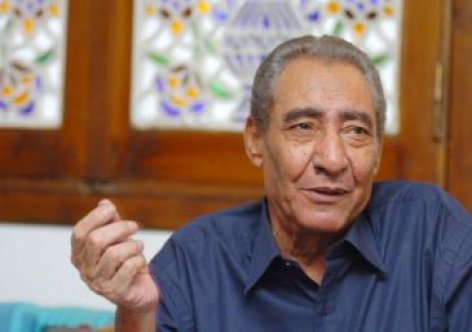Many Egyptians take a moment of grieving silence for the death of Abdel Rahaman el-Abnudi, the esteemed Egyptian poet who passed away on Tuesday at the age of 76.
After years of battling illness and deteriorating lungs, el-Abnudi passed away earlier this afternoon due to repercussions and health complications following a brain surgery he underwent on Sunday.
Dubbed “Al-Khal” (The Uncle), el-Abnudi was the voice the poor, the impoverished, the working class, the peasants, and a wide base of simple Egyptians whose voices barely found room to be heard.
His poetry which was written in the Egyptian dialect (al’amiyya) rather than classical Arabic (fusha) reflected the hopes, fears, aches and dreams of a people which made his works relatable to the common man.
El-Abnudi was born in 1939 in Abnud Village of Qena Governorate in Upper Egypt to Mahmoud el-Abnudi, a marriage official.
His upbringing in Qena was highly influential to his appreciation for language and poetry. It was back in his hometown that he grew to Al-Sirah Al-Hilaliyyah, also known as Al-Hilali epic, an oral epic poet of the Arab folk.
Among his most famous collections of poetry is Al-Sirah Al-Hilaliyyah which he only collected, and did not write. That is in addition to “The Allowed and the Prohibited” (al-Mashrou’ wal-Mamnou’), “Death on the Asphalt” (Al-Mawt ‘ala al-Asphalt), “Earth and the Children” (Al-Ard wal-‘Eyal), “The Silence of the Bell” (Samt al-Garas), and many more.
Like many of the poets in the times following the July 1952 revolution, al-Abnudi contributed greatly to a musical movement which brought together some of the music and language greats who gave birth to iconic works in the Arabic culture.
His poetry was sung by many of the Arabic music veterans in Egypt and the region, including Abdel Halim Hafez, Najat, Shadia, Sabah, Majida el-Roumi, Mohamed Mounir, and the latest being Cairokee whose song “Ehna el-Sha’b” was written by el-Abnudi.
Through his simple yet eloquent poetry, el-Abnudi’s poetry held very strong political views since the 1952 revolution, and afterwards during the ruling periods of Abdel Nasser, Sadat and Mubarak. He continued to express his skeptical and analytical political beliefs during the January 25 uprising and June 30.
Similar to most people who speak the truth, el-Abnudi faced four months of imprisonment during the time of Abdel Nasser despite his support for the president, yet disapproval of his surrounding staff.
Commenting on the time he spent in prison, el-Abnudi said: “When we were arrested, no charges were pressed, and our detention was a nice time. Had we known it was that pleasant, we would have requested to be detained ourselves.”
The honored poet was awarded in several Arab countries including the Egyptian State Award for Arts in the year 2000 marking him the first Egyptian dialect poet to receive the honor. He also received the Mubarak award in Arts (now called the Nile award) in 2010 which is considered to be the most prestigious nationwide.







Comments (0)